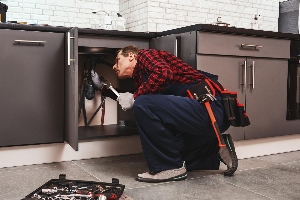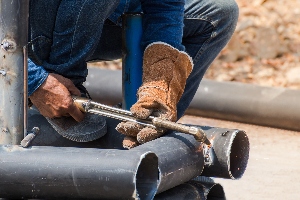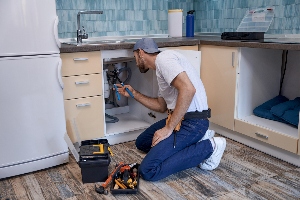Summer plumbing problems often include clogged shower drains, overloaded washing machines, blocked toilets, and garbage disposal issues. We often see a spike in plumbing service calls during the warmer months, and this increase happens because families spend more time at home during summer breaks, guests visit more frequently, and outdoor activities like gardening put extra strain on water systems.
Prevention is always less expensive than emergency repairs, and by understanding common summer plumbing issues, you can take steps to avoid them altogether. Regular maintenance checks before the season begins can save you from dealing with leaky faucets, backed-up sewer lines, or washing machine hose failures during the hottest days of the year.
Understanding Common Summer Plumbing Issues
As temperatures rise, so do the chances of encountering specific plumbing problems that can disrupt your household routines.
Increased Water Usage and Plumbing Strain
Summer activities significantly increase water consumption in most homes, as kids are home from school, playing in sprinklers, and family members take more showers after outdoor activities. This extra demand puts pressure on pipes and fixtures.
Water bills spike by 25-50% during summer months, as the increased usage can reveal previously unnoticed leaks or weaknesses in your plumbing system. Before summer, check for leaks by examining water meter readings before and after a two-hour period when no water is being used. Any change indicates a possible leak.
Also, outdoor hoses left connected and under pressure can cause water hammer, damaging pipe joints over time. Always turn off outdoor faucets completely and consider installing pressure regulators if you notice banging sounds in pipes.
Blocked Drains and Avoiding Clogs
Summer brings more sand, dirt, and debris into your home. Beach trips, gardening, and outdoor play lead to shower drains catching more hair and particles than usual. Kitchen disposals can face extra strain from summer cookouts, so always run cold water when using the disposal and avoid putting fibrous materials like corn husks or celery in it. Bathroom toilets also experience more usage from family gatherings and visitors. Keep a plunger handy and remind guests not to flush anything but toilet paper.
To prevent clogs:
- Use drain screens in showers and tubs
- Rinse feet before entering the house
- Never pour grease down kitchen drains
Sewer Line Backups in Warmer Weather
Warm weather creates ideal conditions for root growth, and tree and shrub roots naturally seek water sources, including the moisture around sewer lines. These roots can infiltrate tiny cracks in pipes, creating blockages that worsen over time. Warning signs include multiple drains backing up simultaneously or gurgling toilets when using sinks. Summer rainstorms compound the problem, as heavy precipitation can force debris into lines and cause backups, especially in older systems.
Schedule preventive maintenance with a professional plumber before summer begins. Hydro-jetting services can clear existing buildup, and camera inspections identify potential problems before they become emergencies. For homes with known root issues, consider annual treatments with copper sulfate products designed for plumbing systems.
Outdoor Plumbing Challenges During Summer
The increased water usage and extreme weather conditions in summer can strain everything from irrigation systems to outdoor faucets.
Inspecting and Maintaining Irrigation Systems
Irrigation systems need regular inspection during the summer months. Check for broken sprinkler heads, which waste water and can cause flooding in parts of your yard, and closely inspect connection points where pipes join together. Also, check for clogs in sprinkler heads that might be caused by dirt or debris.
Set your irrigation timer properly to avoid overwatering. Most lawns only need about 1-1.5 inches of water per week. Watering early in the morning reduces evaporation and helps plants absorb moisture before the heat of the day. Consider installing a rain sensor to automatically shut off your system during rainfall. This simple device can save water and prevent unnecessary strain on your irrigation system.
Gutters and Downspout Concerns
Summer storms can quickly fill gutters with leaves, twigs, and other debris, so clean gutters at least twice during summer to prevent clogs and water damage. Blocked gutters can cause water to overflow and damage your home's foundation. Regularly check for standing water in gutters, too, which can become a breeding ground for mosquitoes.
Look for signs of sagging gutters, which might indicate they're pulling away from your house. Secure loose sections promptly to prevent further damage. Check that your downspouts direct water at least 5-10 feet away from your foundation, and use downspout extensions if needed to ensure proper drainage. This prevents basement flooding and foundation issues.
Hose Bibs and Outdoor Faucets
Check for leaks around the handle and spout of outdoor faucets, as even small drips can waste gallons of water over time and increase your water bill. Inspect hose connections for cracks or splits, and replace damaged washers to create a tight seal. It’s a good idea to install frost-free hose bibs if you don't already have them. Remember to disconnect hoses when not in use. Leaving hoses attached can cause pressure buildup and eventual leaks.
Common hose bib problems include:
- Leaking when turned on
- Dripping when shut off
- Difficult to turn handles
- Water is seeping from the wall behind the faucet
Protecting Home Plumbing Infrastructure
Proper summer maintenance can prevent costly repairs and ensure your plumbing works efficiently during hot weather.
Sump Pump Maintenance and Flood Prevention
Sump pumps are crucial for preventing basement flooding during summer storms, and you should test your sump pump monthly by pouring water into the pit to ensure it activates properly. Replace backup batteries yearly, as power outages often coincide with heavy rainstorms. For homes in flood-prone areas, consider a battery backup or water-powered backup pump for additional protection when primary systems fail.
Installing a backwater valve is another smart preventive measure. This device stops sewage from backing up into your home during intense rainfall. The investment is small compared to the cost of flood damage repair. Ensure you clear any debris from your yard drains and gutters before storm season begins. Clogged drainage systems force water toward your foundation, overwhelming sump pumps and increasing flood risk.
Checking for Leaks After Winter
Winter's freezing temperatures can damage pipes, with leaks often becoming apparent during spring and summer. Inspect all visible pipes for cracks, corrosion, or moisture, and check for hidden leaks by recording your water meter reading, avoiding water use for two hours, then checking again. Any change suggests a leak somewhere in your system.
Examine outdoor faucets and sprinkler systems for winter damage by turning on the water slowly while feeling for vibrations in the pipe, which may indicate a cracked pipe behind your wall. Insulate any exposed pipes, even in summer. This protects against temperature fluctuations that can cause expansion and contraction, extending the life of your plumbing.
Test your water pressure using an inexpensive gauge from a hardware store. Pressure above 80 psi indicates potential problems that could stress your plumbing system and result in leaks.
Upgrading Showers and Fixtures
Low-flow showerheads reduce water usage without sacrificing pressure, saving up to 2,700 gallons annually per household. Touchless faucets in the bathroom also prevent water waste and reduce the spread of germs, which are particularly useful during summer gatherings. When upgrading fixtures, look for the WaterSense label, which guarantees water efficiency. Many water utilities offer rebates for installing these products.
Additionally, replace old toilet flappers to prevent silent leaks. A leaking toilet can waste up to 200 gallons daily. To do this, drop food coloring in the tank – if it appears in the bowl without flushing, you have a leak.
Get in touch to arrange an annual plumbing inspection to get your home ready for summer.












